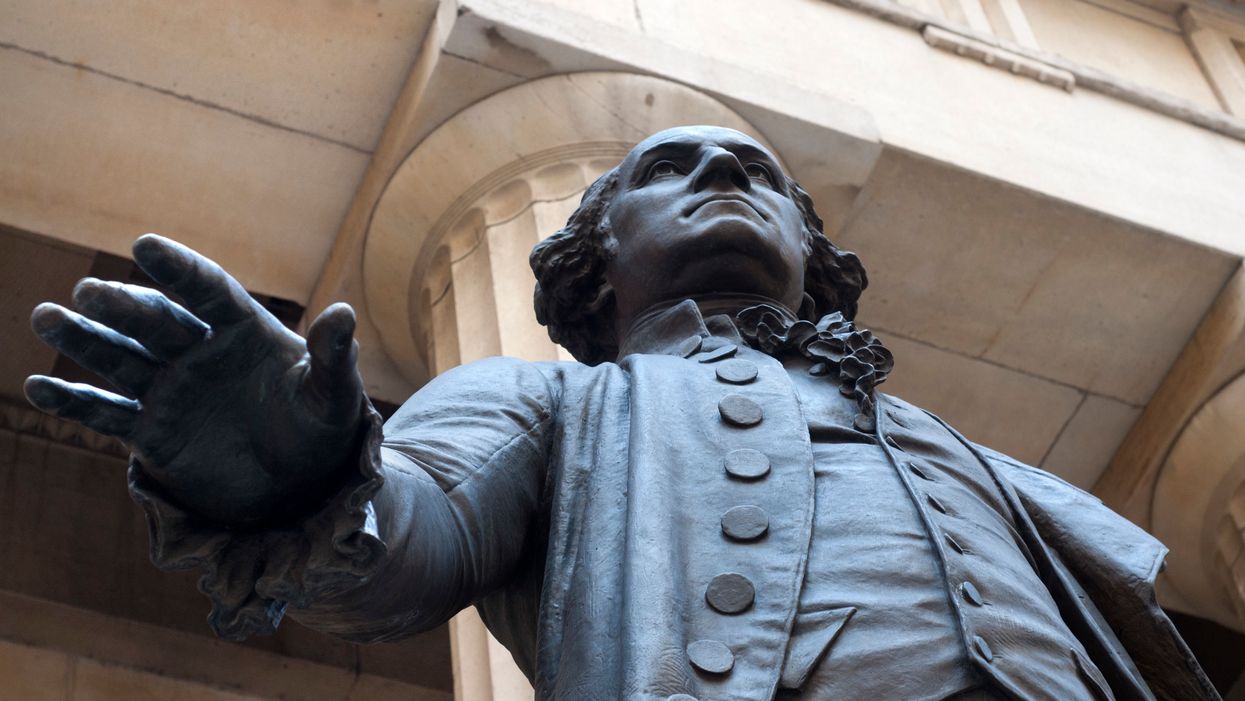Valsania, a professor of American history at the University of Turin, is writing a biography of George Washington.
On Nov. 26, 1789, George Washington woke early. Assisted by his enslaved valets, William "Billy" Lee and the young Christopher Sheels, he powdered his hair, put on his favorite black velvet suit, tied his white neckwear and donned his yellow gloves.
Finally ready, he set out to travel the short distance between the President's House, at what used to be 3 Cherry Street in New York, and St. Paul's Chapel at 209 Broadway.
He had an important aim that day — to celebrate Thanksgiving. Washington had thought carefully about this Thanksgiving, the first of his presidency. On Oct. 3, following the recommendation of a joint committee of the Senate and House, he issued a proclamation urging the people of the United States to celebrate "a day of public thanksgiving and prayer."
But Washington believed that particular Thanksgiving was a crucial occasion. He would use it to call on the people he now led to hold their new country together in the face of forces that he knew could pull it apart.
It was not the first Thanksgiving Americans celebrated. The first took place at Plymouth colony in the autumn of 1621, when Pilgrims held a feast to thank God for their first harvest and invited members of the neighboring Wampanoag tribe.
It was not even the first national Thanksgiving, which was held on Dec. 18, 1777 at then-General Washington's behest. Nor was Thanksgiving yet a federal holiday to be observed every last Thursday of November; it became so with the 1863 proclamation of President Abraham Lincoln. (It's now the fourth Thursday of the month.)
But Nov 26, 1789, happened to be a Thursday, and the weather was miserable. Few New Yorkers showed up at the church to see the president, he noted in his diary.
The president had prepared for the occasion. He also contributed a sizable sum of his own money to buy beer and food for prisoners confined for debt in the city jail. The donation was deemed to be a magnanimous and moving gesture, suitable to the spirit of the holiday. A week later, in an advertisement in the New York Journal, those very prisoners returned their "grateful thanks" to their president "for his very acceptable donation."
Washington's first Thanksgiving as a president may have not been tremendously successful, given the scarce attendance at the church service. Yet it was an important step in his much larger political plan to bring the executive branch to the people's doorstep.
What Washington wanted was a virtuous kind of populism in the new country he led. His populism wasn't about inciting an angry mob; it was about sharing in their rituals, worshiping their God, speaking their own language. And he did so in the sole interest of the American people.
Thanksgiving 1789, for Washington, was at once religious and more than religious. His proclamation invoked devotional language, literally. The upcoming festivity, in his words, could "be devoted by the People of these States to the service of that great and glorious Being, who is the beneficent Author of all the good that was, that is, or that will be."
But Washington's main concern was political. The nation was recently formed, and he feared that it could easily collapse. Its many internal divisions and separate interests could be lethal. Consequently, the president wanted this holiday to be a civic celebration in which "we may then all unite."
As its first president, Washington recognized that the United States was born out of slavery, conquest and violence as much as of sacred principle. Civic unification required acknowledgment of these flaws. Thus, in his proclamation, Washington asked God "to pardon our national and other transgressions."
A tremendously self-aware man, Washington knew that he was a deeply flawed person himself.
He was a slave owner, a relentless pursuer of African American fugitives and a destroyer of Native American villages. He was also a warrior who deployed brutality against enemies. He was a commander who resorted to corporal punishment of his own soldiers. He believed that he was not a saint to be mindlessly imitated. This made him humble in his duties.
More importantly, Washington also grasped the power of his symbolic position as president. He sought to leverage that for the good of the nation.
As president, Washington could not advertise his actions effectively on Twitter or the rest of social media. He had to show himself around constantly, no matter the weather. He had to painstakingly attend balls, plays, dinners, public receptions — and, of course, church. Every occasion, every Thanksgiving counted.
Through his outings, Washington met with a diversity of people, including those who were second-class citizens or not citizens at all. Women, for example, greeted Washington at nearly every stop of the extended presidential trips he took between 1789 and 1791. Textile workers in New England, Jewish leaders in Newport, R.I., many enslaved persons in the South and churchgoers everywhere did the same.
These women and men, in bondage or free, believers or skeptics, played a part in the invention of a new political theater. Maybe, it was just a theatrical illusion. But these individuals — just like the prisoners in the New York City jail — thanked their new president because they felt they were voices in a larger political culture.
Washington made sure his Thanksgiving message — not simply a message, but a "proclamation" — sounded clear and strong: May God "render our national government a blessing to all the people, by constantly being a Government of wise, just, and constitutional laws, discreetly and faithfully executed and obeyed."
This article is republished from The Conversation under a Creative Commons license. Click here to read the original article.
![]()



















Trump & Hegseth gave Mark Kelly a huge 2028 gift